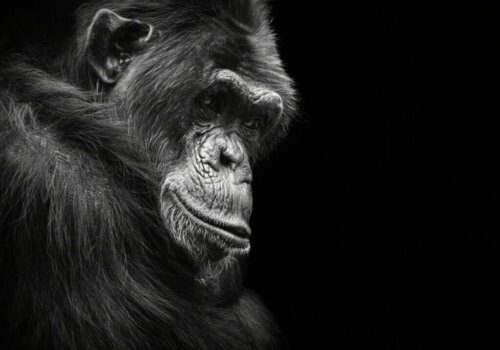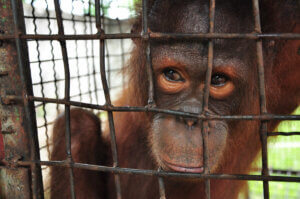6 Animals that Can Suffer from Depression

Depression is a condition with one of the highest numbers of awareness campaigns in recent times, even when occurring in non-human living beings. There are more and more cases of animals that can suffer from depression, which supports the general perception that we’re mentally more similar to other species than previously thought.
In this article, you’ll see some examples of animal species in which this disorder has been proven to exist. Once you take in this information, you’ll know that the existence of animals’ emotions was obvious all along.
What’s depression?
Depression is a mental disorder characterized by deep sadness that doesn’t end on its own, and interferes with the normal course of daily life. This is true for humans as well as for other species, because the emotional mechanisms in the brain are similar in all species or at least in all mammals.
How do we know if an animal is suffering from depression? Luckily, sadness isn’t only conveyed in words for a psychologist to analyze. Someone suffering from depression doesn’t always cry or have a distressed expression. They may neglect grooming, stop eating, spend all day lying down or even be aggressive. These are symptoms present in all species.
Humans can talk to each other about how they feel, but unfortunately, they don’t share this level of communication with other animals. To evaluate animals’ mental state, we must first be familiar with their normal behavior in the wild. Then, we must analyze what events may have caused the change in behavior and animals’ ways of showing it.
Animals that may suffer from depression
Here’s a list of animals that may suffer from depression. They’re not the only ones, but they’re the most representative and well-known.
1. Animals that may suffer from depression: primates
These animals have been among the first to be diagnosed. The paradox is that their captivity is the cause of their depression while also giving us the opportunity to study the behavior and physiology associated with this disorder.
Studies have shown that humans and large primates are so similar that, indeed, when they look depressed, they really are suffering from depression: the signs are very similar.
A depressed primate shows behavior such as inactivity, blank stares, repetitive behavior, and anorexia. It may also show mutilations, bald spots or signs of fighting with individuals from the same species. Records also show several cases of suicide attempts.
In the wild, depressive events have also been registered in primates, but they’re usually linked to stressful life situations, such as mourning the death of a loved one. Records show cases of post-traumatic stress disorder and anxiety disorders related to these types of experiences.

2. Dolphins and other cetaceans
Dolphins exploited for human entertainment also show evidence of depressive behavior. They’re used to living in large groups and traveling long distances daily. So, social isolation, health problems resulting from living in a pool, and a lack of environmental enrichment eventually deteriorates their mental health.
It’s common to observe dolphins swimming erratically, hitting aquarium walls, losing their appetite or becoming immobile and apathetic when they suffer from depression. Often, injuries resulting from hitting the walls result in the animals’ death. Therefore, the idea that these mammals are capable of committing suicide is currently contemplated.

3. Dogs
Dogs have been living with humans for centuries. So, there was already a wealth of knowledge about their ability to show emotions. Fortunately, today there’s even more awareness regarding their mental health.
Depressed dogs exhibit behaviors such as apathy, anorexia and lack of grooming. It’s important to make a good diagnosis, as canine depressions often go hand in hand with anxiety. Dogs can have aggressive or nervous behavior —such as excessive scratching or other repetitive behavior— which can be associated with depression.

4. Cats
Cats are especially sensitive to anxiety and may suffer from depression along with anxiety. Felines are more likely to exhibit lethargic behaviors than dogs. Some of these include the following:
- Lack of appetite
- Not grooming
- Not wanting to play
- Hiding most of the time
- Sleeping too much or at unusual hours

5. Birds
It’s not only mammals that can suffer from depression. Birds, especially gregarious ones, can suffer from depression due to events such as the death of a loved one or prolonged social isolation.
Symptoms vary depending on the species, but the most notable cases occur among parrots. These birds often manifest depression with symptoms similar to those of physical illnesses: ruffled feathers, anorexia or atypical molting patterns. In addition to these clinical signs, we can commonly observe itching or aggression between individuals as well.

6. Elephants
These pachyderms have a deep and complex emotional life and strong family bonds. The loss of loved ones and the isolation caused by poaching and captivity wreak havoc on the mental health of these animals. Records show many cases of elephants locked up in zoos suffering from depression and anxiety.
But it’s not only in captivity that elephants can suffer from depression. Studies on the African elephant (Loxodonta africana) revealed that teenagers born to mothers killed by poachers take revenge on humans due to the traumas suffered in their childhood.

A final thought on animals that can suffer from depression
It’s true that animals such as sea sponges or reef corals, which have a very basic nervous system, cast doubt on whether all animals can suffer from depression. The rules described here don’t apply to all animal species, because in order to feel intricate emotions it’s necessary to have a complex nervous system.
What the studies do reveal, however, is that subjecting an animal to emotional distress for a prolonged period of time has disastrous effects on its mental health. Taking this into account, awareness is essential: no one has the right to mistreat others.
All cited sources were thoroughly reviewed by our team to ensure their quality, reliability, currency, and validity. The bibliography of this article was considered reliable and of academic or scientific accuracy.
Harlow HF, Dodsworth RO, Harlow MK (1965) Total social isolation in monkeys. Proc Natl Acad Sci U S A 54: pp. 90 – 97.
Gilmer, W. S., & McKinney, W. T. (2003). Early experience and depressive disorders: human and non-human primate studies. Journal of affective disorders, 75(2), 97-113.
Dolphins in captivity: realities and perspectives. Ligia Dorina Dima & Carmen Gache. Analele Ştiinţifice ale Universităţii „Al.I.Cuza” Iaşi, s. Biologie animală, Tom L, 2004. The Museal Complex of Contanţa, Al.I. Cuza” University of Iaşi.
Poole, J. (2021). Our team. Elephant Voices. https://www.elephantvoices.org/about-elephantvoices/team.html